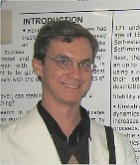The Ghost in the System: Where Free Will Lurks in Human Minds
By late January 2002, the FBI had strategically secured what documents remained at Enron’s Houston headquarters following evidence that employees were destroying documents that implicated them in wrong-doing in what was one of the greatest accounting scandals in United States history. Company staff fed reams of papers through shredders, one employee even taking home some of the scrapped documents to use as packing material (CNN, 2002). With the Enron scandal a prominent fixture in the news throughout late 2001 and into 2002, certainly those shredding the documents were responsible for their actions and should be held accountable. After all, they knew what they were doing, they chose to do it, and the actions they performed required both thought and a conscious decision to not engage in alternative actions. In acting with self-awareness, personal choice, consciousness, and a sense of purpose, the employees demonstrated the hallmarks of what is commonly regarded as free will.
The Free Will Debate: Psychological Science versus Psychological Reality
As compelling as this conclusion is, it doesn't sit well with scientific psychology. Of course, if free will is defined as choice, higher-level thought, or goal-directed behavior, then there is no problem. Free will simply becomes an umbrella term for these well-documented features of human experience. But free will has other connotations that fly in the face of scientific assumptions about the sources of human thought and action (e.g., (Bargh & Chartrand, 1999; Skinner, 1971). The most troublesome connotation is that freely chosen actions are somehow decoupled from the causal forces that are presumed to underlie any action. Regardless of physiological processes, developmental history, or current circumstances, the person is "free" to choose any course of action among the alternatives that present themselves. This view of human behavior is simply untenable from a scientific perspective. If psychologists believed that thoughts, feelings, and actions could spring from nowhere without warning, they would be resigned to ascribing human experience to chance, or worse, to the philosophically untenable notion of thehomunculus (the little man inside the head) and the infinite regress it implies.
Scientific psychology, at least in its contemporary form, does not deny that people think and make conscious choices. However, any choice that a person makes reflects the interactions of multiple influencing forces, from genetics and neurotransmitters to family size and cultural traditions. The precise cause and effect relation leading to a person’s conscious action can seem mysteriously lost because of these many complex forces, but that does not mean human experience operates independently of deterministic factors. The alternative, from a scientific perspective, is to posit a “ghost in the machine” that controls a person’s conscious will in ways that are immeasurable and cannot be tested.
Science is one thing; the reality of social life is another. In the social mind, free will is synonymous with personal control and responsibility. If people believed that every thought, feeling, and action resulted from causal processes over which they had no control, they would be hard-pressed to blame the Enron employees for their actions, let alone send them to prison and otherwise hold them accountable. People can certainly be influenced by external forces (e.g., authority, social pressure, stress), personal history (e.g., insecure attachment, poverty, trauma), and biological processes (e.g., hormones, neurotransmitters, neurological mechanisms), but ultimately people are held responsible for what they do. We pass harsh judgment on people who engage in immoral or illegal behavior, condemning them to severe punishment if the behavior is sufficiently offensive. By the same token, we admire others who resist temptations, act heroically, or defy malevolent authority—even if science can specify the conditions and personality characteristics that make such behavior understandable, even inevitable.
The assumption of free will goes beyond crime and punishment or virtue and reward. It colors our daily interactions in mundane settings. We react to one another as if we are origins rather than pawns, capable of choosing how to think and behave as we navigate the field of forces in everyday life. We give a certain amount of latitude to people who point out external reasons (e.g., social pressure), internal states (e.g., anxiety), and past events (e.g., insecure childhood) for their behavior, but at some point such explanations are seen as excuse-making, rationalization, or lack of willpower.


